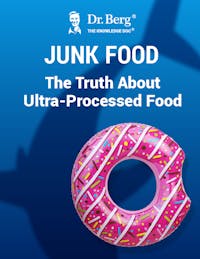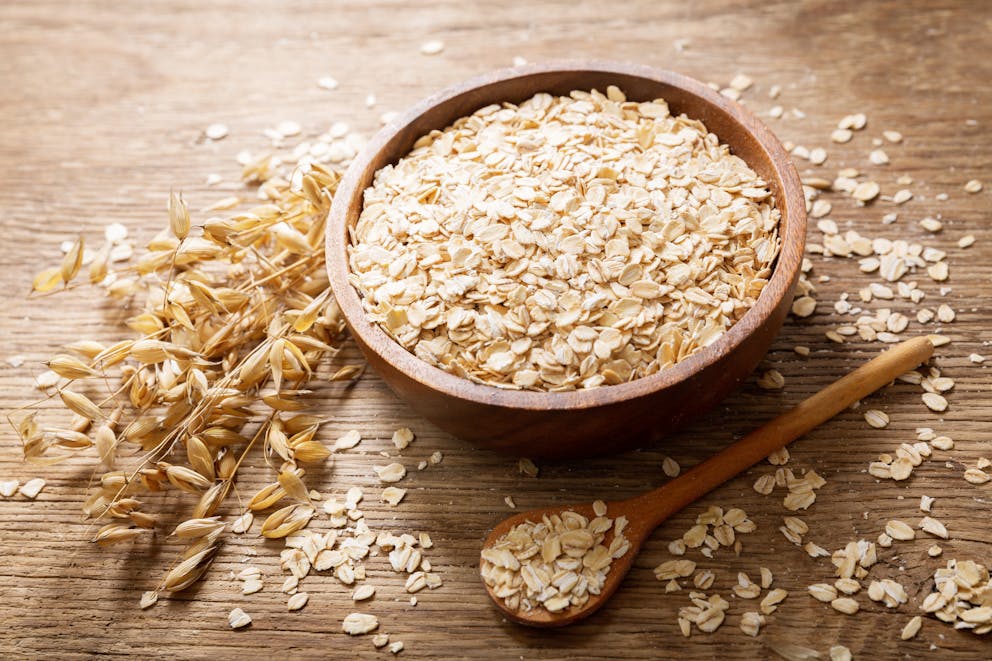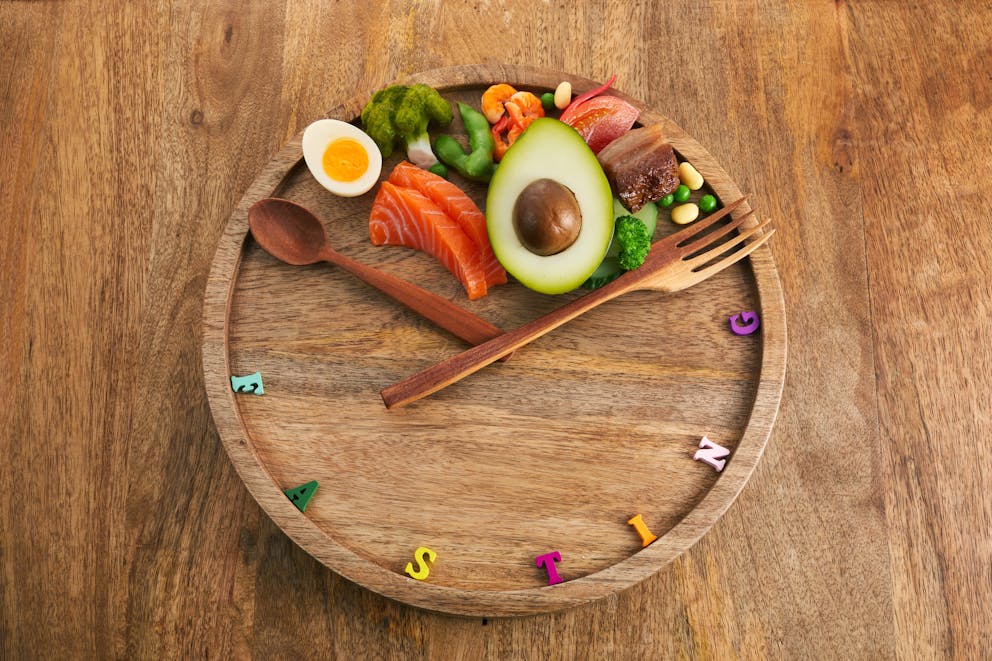Might Want to Think Twice Before Eating Oatmeal

Junk Food: The Truth About Ultra-Processed Food
Learn about the detrimental impact of ultra-processed foods on health and well-being
Discover the top four dangerous hidden ingredients in everyday foods
Understand the health risks associated with consuming ultra-processed foods
Recognize misleading nutrition labels to make informed dietary choices
Get practical tips for choosing minimally processed whole foods for better health

Junk Food: The Truth About Ultra-Processed Food
Learn about the detrimental impact of ultra-processed foods on health and well-being
Discover the top four dangerous hidden ingredients in everyday foods
Understand the health risks associated with consuming ultra-processed foods
Recognize misleading nutrition labels to make informed dietary choices
Get practical tips for choosing minimally processed whole foods for better health

Junk Food: The Truth About Ultra-Processed Food
Learn about the detrimental impact of ultra-processed foods on health and well-being
Discover the top four dangerous hidden ingredients in everyday foods
Understand the health risks associated with consuming ultra-processed foods
Recognize misleading nutrition labels to make informed dietary choices
Get practical tips for choosing minimally processed whole foods for better health

Junk Food: The Truth About Ultra-Processed Food
Learn about the detrimental impact of ultra-processed foods on health and well-being
Discover the top four dangerous hidden ingredients in everyday foods
Understand the health risks associated with consuming ultra-processed foods
Recognize misleading nutrition labels to make informed dietary choices
Get practical tips for choosing minimally processed whole foods for better health

Junk Food: The Truth About Ultra-Processed Food
Learn about the detrimental impact of ultra-processed foods on health and well-being
Discover the top four dangerous hidden ingredients in everyday foods
Understand the health risks associated with consuming ultra-processed foods
Recognize misleading nutrition labels to make informed dietary choices
Get practical tips for choosing minimally processed whole foods for better health

Junk Food: The Truth About Ultra-Processed Food
Learn about the detrimental impact of ultra-processed foods on health and well-being
Discover the top four dangerous hidden ingredients in everyday foods
Understand the health risks associated with consuming ultra-processed foods
Recognize misleading nutrition labels to make informed dietary choices
Get practical tips for choosing minimally processed whole foods for better health

Junk Food: The Truth About Ultra-Processed Food
Learn about the detrimental impact of ultra-processed foods on health and well-being
Discover the top four dangerous hidden ingredients in everyday foods
Understand the health risks associated with consuming ultra-processed foods
Recognize misleading nutrition labels to make informed dietary choices
Get practical tips for choosing minimally processed whole foods for better health

Junk Food: The Truth About Ultra-Processed Food
Learn about the detrimental impact of ultra-processed foods on health and well-being
Discover the top four dangerous hidden ingredients in everyday foods
Understand the health risks associated with consuming ultra-processed foods
Recognize misleading nutrition labels to make informed dietary choices
Get practical tips for choosing minimally processed whole foods for better health

Junk Food: The Truth About Ultra-Processed Food
Learn about the detrimental impact of ultra-processed foods on health and well-being
Discover the top four dangerous hidden ingredients in everyday foods
Understand the health risks associated with consuming ultra-processed foods
Recognize misleading nutrition labels to make informed dietary choices
Get practical tips for choosing minimally processed whole foods for better health

Junk Food: The Truth About Ultra-Processed Food
Learn about the detrimental impact of ultra-processed foods on health and well-being
Discover the top four dangerous hidden ingredients in everyday foods
Understand the health risks associated with consuming ultra-processed foods
Recognize misleading nutrition labels to make informed dietary choices
Get practical tips for choosing minimally processed whole foods for better health

Junk Food: The Truth About Ultra-Processed Food
Learn about the detrimental impact of ultra-processed foods on health and well-being
Discover the top four dangerous hidden ingredients in everyday foods
Understand the health risks associated with consuming ultra-processed foods
Recognize misleading nutrition labels to make informed dietary choices
Get practical tips for choosing minimally processed whole foods for better health

Junk Food: The Truth About Ultra-Processed Food
Learn about the detrimental impact of ultra-processed foods on health and well-being
Discover the top four dangerous hidden ingredients in everyday foods
Understand the health risks associated with consuming ultra-processed foods
Recognize misleading nutrition labels to make informed dietary choices
Get practical tips for choosing minimally processed whole foods for better health

Junk Food: The Truth About Ultra-Processed Food
Learn about the detrimental impact of ultra-processed foods on health and well-being
Discover the top four dangerous hidden ingredients in everyday foods
Understand the health risks associated with consuming ultra-processed foods
Recognize misleading nutrition labels to make informed dietary choices
Get practical tips for choosing minimally processed whole foods for better health

Junk Food: The Truth About Ultra-Processed Food
Learn about the detrimental impact of ultra-processed foods on health and well-being
Discover the top four dangerous hidden ingredients in everyday foods
Understand the health risks associated with consuming ultra-processed foods
Recognize misleading nutrition labels to make informed dietary choices
Get practical tips for choosing minimally processed whole foods for better health

Beginner’s Guide to Healthy Keto & Intermittent Fasting
Receive a step-by-step guide to starting Healthy Keto® and intermittent fasting
Learn about foundational principles and best practices for beginners
Get detailed visual guidance on portion sizes and meal composition
Discover how to set achievable goals and monitor your progress
Find practical tips for overcoming common challenges and staying motivated

Beginner’s Guide to Healthy Keto & Intermittent Fasting
Receive a step-by-step guide to starting Healthy Keto® and intermittent fasting
Learn about foundational principles and best practices for beginners
Get detailed visual guidance on portion sizes and meal composition
Discover how to set achievable goals and monitor your progress
Find practical tips for overcoming common challenges and staying motivated

Beginner’s Guide to Healthy Keto & Intermittent Fasting
Receive a step-by-step guide to starting Healthy Keto® and intermittent fasting
Learn about foundational principles and best practices for beginners
Get detailed visual guidance on portion sizes and meal composition
Discover how to set achievable goals and monitor your progress
Find practical tips for overcoming common challenges and staying motivated

Beginner’s Guide to Healthy Keto & Intermittent Fasting
Receive a step-by-step guide to starting Healthy Keto® and intermittent fasting
Learn about foundational principles and best practices for beginners
Get detailed visual guidance on portion sizes and meal composition
Discover how to set achievable goals and monitor your progress
Find practical tips for overcoming common challenges and staying motivated

Beginner’s Guide to Healthy Keto & Intermittent Fasting
Receive a step-by-step guide to starting Healthy Keto® and intermittent fasting
Learn about foundational principles and best practices for beginners
Get detailed visual guidance on portion sizes and meal composition
Discover how to set achievable goals and monitor your progress
Find practical tips for overcoming common challenges and staying motivated

Beginner’s Guide to Healthy Keto & Intermittent Fasting
Receive a step-by-step guide to starting Healthy Keto® and intermittent fasting
Learn about foundational principles and best practices for beginners
Get detailed visual guidance on portion sizes and meal composition
Discover how to set achievable goals and monitor your progress
Find practical tips for overcoming common challenges and staying motivated

Beginner’s Guide to Healthy Keto & Intermittent Fasting
Receive a step-by-step guide to starting Healthy Keto® and intermittent fasting
Learn about foundational principles and best practices for beginners
Get detailed visual guidance on portion sizes and meal composition
Discover how to set achievable goals and monitor your progress
Find practical tips for overcoming common challenges and staying motivated

Beginner’s Guide to Healthy Keto & Intermittent Fasting
Receive a step-by-step guide to starting Healthy Keto® and intermittent fasting
Learn about foundational principles and best practices for beginners
Get detailed visual guidance on portion sizes and meal composition
Discover how to set achievable goals and monitor your progress
Find practical tips for overcoming common challenges and staying motivated

Beginner’s Guide to Healthy Keto & Intermittent Fasting
Receive a step-by-step guide to starting Healthy Keto® and intermittent fasting
Learn about foundational principles and best practices for beginners
Get detailed visual guidance on portion sizes and meal composition
Discover how to set achievable goals and monitor your progress
Find practical tips for overcoming common challenges and staying motivated

Beginner’s Guide to Healthy Keto & Intermittent Fasting
Receive a step-by-step guide to starting Healthy Keto® and intermittent fasting
Learn about foundational principles and best practices for beginners
Get detailed visual guidance on portion sizes and meal composition
Discover how to set achievable goals and monitor your progress
Find practical tips for overcoming common challenges and staying motivated

Beginner’s Guide to Healthy Keto & Intermittent Fasting
Receive a step-by-step guide to starting Healthy Keto® and intermittent fasting
Learn about foundational principles and best practices for beginners
Get detailed visual guidance on portion sizes and meal composition
Discover how to set achievable goals and monitor your progress
Find practical tips for overcoming common challenges and staying motivated

Beginner’s Guide to Healthy Keto & Intermittent Fasting
Receive a step-by-step guide to starting Healthy Keto® and intermittent fasting
Learn about foundational principles and best practices for beginners
Get detailed visual guidance on portion sizes and meal composition
Discover how to set achievable goals and monitor your progress
Find practical tips for overcoming common challenges and staying motivated

Beginner’s Guide to Healthy Keto & Intermittent Fasting
Receive a step-by-step guide to starting Healthy Keto® and intermittent fasting
Learn about foundational principles and best practices for beginners
Get detailed visual guidance on portion sizes and meal composition
Discover how to set achievable goals and monitor your progress
Find practical tips for overcoming common challenges and staying motivated
Might Want to Think Twice Before Eating Oatmeal
Oatmeal is a breakfast staple for many, loved for its heartiness and health benefits. However, peering beneath its cherished exterior reveals a complex world of nutritional intrigue and hidden concerns waiting to be explored.
This article will shed light on the cholesterol-lowering power of beta-glucan in oats, how oatmeal consumption affects blood sugar levels, and why these aspects are crucial for your health.
We'll also tackle less discussed topics like the gluten concern due to avenin in oats and potential glyphosate contamination. These topics offer a holistic perspective on how oatmeal influences your health.
To wrap things up, we'll not leave you in the lurch; we'll guide you on how to sidestep these hazards so you can still relish your oatmeal without fretting. Plus, after reading this piece, no worries if oatmeal doesn't fit your dietary needs anymore!
We've got alternatives lined up that might do the trick.
Unveiling the Health Impacts of Oatmeal
Oatmeal transcends the simplicity of a morning meal, serving as a powerhouse for enhancing heart health and stabilizing glucose concentrations. But, like anything in life, it's not perfect.
The Cholesterol-Lowering Power of Beta-Glucan
Beta-glucan is a type of fiber found in oats that does wonders for lowering cholesterol. Consuming three grams daily can significantly reduce cholesterol levels.
This substance morphs into a gel within your digestive system, trapping and expelling the harmful LDL cholesterol from your physique to prevent arterial chaos.
Studies comparing oatmeal to white bread have significantly improved participants' cholesterol levels.
Blood Sugar Levels and Oatmeal Consumption
If you're watching your blood sugar, oatmeal might be a wise choice due to its low glycemic index (GI). It slowly releases glucose into the bloodstream, preventing those dreaded spikes.
Research involving individuals with diabetes has highlighted how incorporating oatmeal into their diet improved their blood glucose control compared to more refined options like white bread.

The Gluten Concern: Avenin in Oats
Oats are often hailed as a heart-healthy breakfast option but come with their bag of tricks. Among these is avenin, a protein similar to gluten found in wheat. For some folks, especially those with celiac disease or non-celiac gluten sensitivity, this can spell trouble.
While most people digest oats without issue, individuals sensitive to gluten might find that avenin triggers an inflammatory response akin to that caused by traditional gluten. It's not all doom and gloom; the reaction varies widely from person to person.
A critical point is that oats contain only small amounts of avenin compared to wheat, barley, and rye glutens. Many who manage their sensitivities well or have milder intolerance could enjoy oats with minimal risk.
Still, research shows even trace amounts can cause issues for some. Deciding to include oats in your diet hinges on recognizing how much your system can handle.
Glyphosate Contamination in Oat Products
Imagine your morning bowl of oatmeal coming with a side of unwanted chemicals. That's what's happening when glyphosate, a drying agent used in oats and wheat crops, sneaks into our food.
Shockingly, over 95% of oat products tested were found to contain this herbicide. This isn't just about having an extra ingredient not listed on the box. In a troubling revelation by the World Health Organization, glyphosate has been labeled as a cancer-causing agent.
It’s been linked to an increased risk of non-Hodgkin's lymphoma, making those seemingly innocent oats not so benign after all.
To navigate this issue without giving up on oats altogether, consider switching to organic options, less likely to be contaminated with glyphosate.
While it might seem like a small change, it can significantly reduce exposure to these harmful chemicals and make that morning bowl comforting again.
Navigating the Risks and Benefits of Oatmeal Consumption
Dive into the complex ecosystem of the human microbiome and its essential role in maintaining health. Explore the various factors that can compromise microbiome diversity, from dietary choices to antibiotic use.
Understanding these influences is critical to promoting a balanced, resilient microbiome for overall well-being.
Opting for Organic and Steel-Cut Oats
Oatmeal lovers take note. To sidestep potential health risks, consider switching to organic, steel-cut oats. Why? Well, they're less processed than their instant counterparts and come with a lower risk of glyphosate contamination—a herbicide that's been making headlines.
Studies have found glyphosate in over 95% of oat products tested. It's not merely a matter of dodging chemicals; it equally pertains to maximizing the nutritional value derived from your expenditure.
Steel-cut oats offer a denser nutrient profile due to minimal processing.
Understanding Relative Health Improvements
Let me put this straight: when you hear oatmeal is good for you, remember—it’s all relative. Comparisons often pit oatmeal against white bread, showing significant improvements in cholesterol and blood sugar levels for the former.
But here's the kicker: while opting for oatmeal over white bread is like choosing a hero over zero in nutritional terms, don’t be fooled into thinking it’s the ultimate superfood without considering its entire context within your diet.
Alternatives to Traditional Oatmeal Consumption
If you're wary about the health risks of oatmeal, such as gluten sensitivity or glyphosate contamination, fret not. There's a world beyond traditional oatmeal that offers nutritional benefits without these concerns.

The Role of Intermittent Fasting
Intermittent fasting (IF) stands out as an intriguing alternative. It's not just skipping breakfast; it’s a structured eating pattern that cycles between periods of eating and fasting.
Adopting this strategy could elevate metabolic rates, facilitate fat reduction, and potentially enhance glycemic control - advantages commonly linked to chronic ingestion of oats.
A significant aspect of IF is its flexibility. You can choose from various methods, like the 16/8 or 5:2 diet, based on your lifestyle and health goals.
For some, this might even be more appealing than figuring out if their bowl of oats is free from contaminants or not meeting their dietary needs due to gluten issues.
To get started with intermittent fasting or learn more about different types, check out this comprehensive guide.
It provides insights into how you can seamlessly integrate IF into your life while reaping similar—if not superior—health advantages compared to those promised by traditional oatmeal consumption.
Conclusion
Loaded with beta-glucan, oatmeal hits hard by reducing cholesterol and keeping blood sugar levels steady. But are there health risks associated with oatmeal consumption? Absolutely.
Keep an eye on avenin; it's not gluten-free friendly. Glyphosate contamination? It's natural and risky.
Pick organic, steel-cut oats to dodge those dangers. Remember, improvements hinge on the comparison – white bread isn't our benchmark for health.
If oats don’t cut it for you anymore, consider intermittent fasting. Exploring this path could very well unlock the door to a healthier you.
Remember that balance is critical in every spoonful of life’s choices - including oatmeal.
Supporting Data
https://pubmed.ncbi.nlm.nih.gov/21843037/
https://www.ncbi.nlm.nih.gov/pmc/articles/PMC3524229/
Previous blog
The Secret to Increasing the Diversity of Gut MicrobesNext blog
The #1 Best Remedy for EczemaTags

Popular
08/21/2024
55.7K views
02/23/2025
46.8K views
11/18/2024
281K views
03/18/2024
11/21/2022




